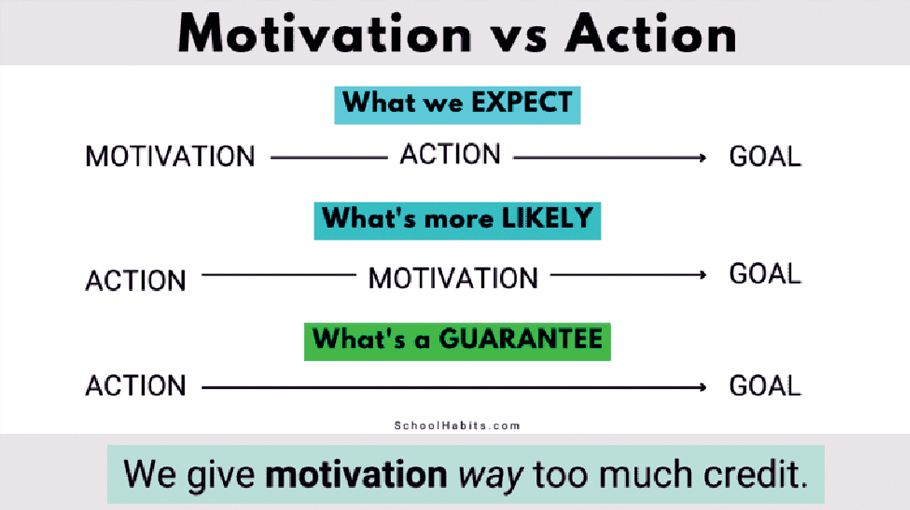How to study when you have no motivation

Motivation is a funky topic – one that is often misunderstood and mischaracterized. As I explain in detail below, in many cases motivation is a luxury. We must start with this baseline understanding. It is powerful, it is helpful, but it is not required to do things.
Tactical ways to increase your motivation to study
The following tips and tricks can help increase your motivation to study by harnessing the power of novelty and urgency. If you think your low motivation is due to the fact that you don’t know how to do something, you need these tips.
Assess and address the cause.
Sometimes there’s an obvious reason for low motivation. Are you tired? Hungry? Anxious? Distracted by other matters? Studying is a cognitively demanding process, one that can’t be done if you’re tired, hungry, anxious or thinking about other things. If your low motivation is easily addressed with a snack or a brisk wake-me-up walk, then do that.
Make a study schedule
Clarity is the enemy of procrastination. In other words, the more clarity we have about something, the more we can visualize ourselves doing it… and the more likely we’ll actually do it. Instead of thinking “I have to study on Saturday,” make a detailed plan of what you’ll study, when you’ll study it, for how long, and where. This is exactly how to make a study schedule.
Tackle one topic at a time
This motivation strategy naturally follows the one above. Once you make a study schedule, you will have a more digestible timeline for studying. Keep in mind that when something is too “big” or vague for our brains to visualize, our motivation tanks. If you know, for example, that you’ll be studying Chapter 1 on Tuesday and Chapter 2 on Wednesday, your brain will see it as a doable task. This in turn can increase your motivation to study.
Break down the task into micro-steps
Once you create a study schedule (tip 2) that considers one topic at a time (tip 3), it’s time to break down your study plan further. If we use the example in the previous paragraph – that you’ll study Chapter 1 on Tuesday – you need to figure out what that means. Will you start with vocabulary? Will you start by making flashcards, rewriting your notes, or doing practice questions? Once you get specific, you can figure out the micro-steps involved.
Set a timer
To increase study motivation with urgency, give your brain a predetermined ending time. We can rally and endure difficult tasks when we know when they’ll end. I suggest you study for no more than 45-60 minutes before taking a break. Here’s the best way to spend your study break.
Get rid of distractions
You know this. You’ve read it before, heard it before, and deep down inside you know it’s true. But, have you actually tried it? Have you ACTUALLY put away your phone (and your friends!) and shut down your tabs? I dare you.
Switch up your study time and location
We can increase our motivation to study by adding novelty, and one way to do this is by studying at a different time and location than usual. Do you typically study in the kitchen after lacrosse practice? Try studying in your local public library on Saturday at 3:00.
Form a study group
It’s easier to study when you have no motivation … if you have accountability. If you know you’re meeting three friends to study after school, you’ll show up regardless of how motivated you feel. (More evidence that motivation is often irrelevant to getting the thing done.) I always suggest that you first study independently and then form a study group, but if you can’t even bring yourself to study your materials alone, start with the group session.
Do parallel work with someone
If it’s impractical to form a study group because your classmates don’t live close by or you have different schedules, plan a parallel study or work session with someone not in your class. You don’t have to be studying the same material, but you just have to be studying in the same room and have similar goals.
Make it a habit to study at the same time each day
This motivation strategy won’t work in a pinch, but it’s one that works over time. If you make it a habit to do homework and study at the same time each day, you’ll program your mind to expect the task. When you expect the task, it’s no longer a decision you have to make in the moment.




